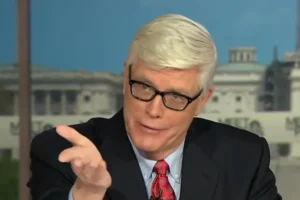 Talk radio host Hugh Hewitt is stepping into the debate over whether FM stations should be allowed to geo-target content.
Talk radio host Hugh Hewitt is stepping into the debate over whether FM stations should be allowed to geo-target content.
“The ‘Zonecasting’ proposal at the commission now greatly endangers [the] prospect of a robust political dialogue,” Hewitt wrote in a letter on Salem Media Group letterhead, addressed to Commissioner Brendan Carr and filed as a comment in the current notice of proposed rulemaking.
He called it “a torpedo aimed at midship for my program and those like it.”
Zonecasting is the proposed technical method of using specialized booster systems to allow FM stations to air different programming to sub-sectors of their signal coverage. Its proponent GeoBroadcast Solutions has asked the commission to allow such programming for a few minutes per hour.
The National Association of Broadcasters last year came out strongly against geo-targeting. Among those who have been supportive of the idea are the Multicultural Media, Telecom and Internet Council and the National Association of Black Owned Broadcasters.
The FCC has taken many comments on the idea, but recently asked for more, nominally to allow people to comment specifically on tests that GBS conducted at two stations using the technology. (NAB and NPR had asked the commission to extend the latest comment deadline to give them time to study those test results, but the commission refused, and comments are due Monday.)
Hewitt told Carr: “I am concerned that a proposal before the commission could do significant and potentially permanent financial harm to the radio industry, while lining the pockets of the Big Tech platforms that actively engage in political censorship. You have been an outspoken leader in pushing back against political censorship by Big Tech and others.”
Hewitt thanked Carr, the senior Republican on the FCC, for his attention to “growing and alarming attacks on free speech.” Though a conservative, he said he is “concerned for the younger talkers, left, right and center than for me.” Noting that his show has featured guests from across the political spectrum, he said: “Talk radio is the real public square, maybe the last one. Zonecasting threatens that public square.”
In his view, the idea “is opposed by virtually the entire broadcast industry, from the smallest rural stations to larger urban groups and every one in between.” Hewitt cited arguments that sub-dividing FM signals would put more downward pressure on local ad rates, slicing up local ad markets into smaller zones at lower cost to the advertiser.
“[T]his type of capability — whether done on a limited or voluntary basis — could very well be the final straw for many stations — especially smaller stations — and would only further strengthen digital platforms such as Google, Twitter, and Meta — the very entities that have been the quickest to censor political speech.”
He believes geo-targeting presents “a real threat to the one mass media platform that still values and encourages free expression of political thought.”




